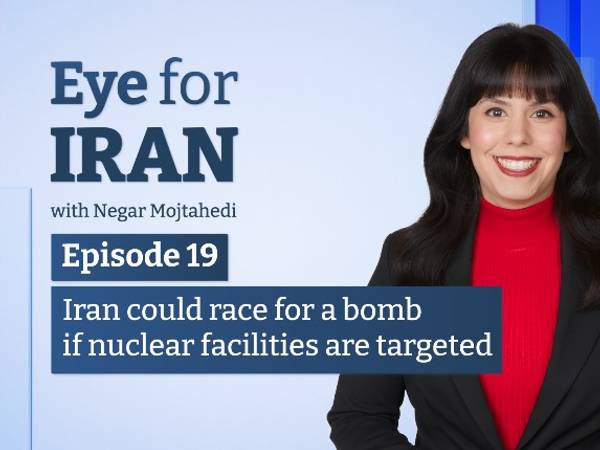Iran is nervous about potential Israeli strikes on its nuclear facilities and is now using its controversial atomic program as leverage to send a message - not to the Israelis but rather to the United States, a Middle East security expert says.
Alex Vatanka, founding Director of the Iran Program at the Middle East Institute, appeared on this week's Eye for Iran.
What the Islamic government in Tehran fears most is an attack on its nuclear infrastructure - its main accomplishment during 45 years of rule - Vatanka said.
The Iranian government is likely pressuring the American administration to rein in Israeli actions to prevent any attack on their nuclear sites, following the October 1 Iranian missile barrage, he said.
CNN is reporting that Iran is nervous and has engaged in diplomatic efforts with Mideast countries to try and reduce the magnitude of Israel's response to its ballistic missile attack earlier this month.
On Friday, Iran's president Masoud Pezeshkian met with Russia's Vladmir Putin, who called for a new 'world order' of Russian allies. Last week, Iran met with Saudi's Foreign Minister. Israeli's Channel 12 news reported that the United States and Arab nations were conducting secret backchannel negotiations with Iran aimed at reaching a comprehensive regional ceasefire. The US denies those claims.
CNN cited sources familiar with the matter, alleged that Tehran is anxious about whether the US can convince Israel to reduce the scale of their response.
This week a group of more than three dozen lawmakers in Iran have called for the country to pursue nuclear weapons. The unprecedented openness of Iranian officials and media discussing the possibility of a nuclear bomb—something unthinkable just a few years ago.
This all goes back to Iran's fear and growing uncertainty, Vatanka told the Eye for Iran Podcast.
"It indicates one important fear that the regime has as Iran is waiting to see what Israel will do in terms of its retaliation," said Vatanka.
"The message is to the United States: If you don't stop Israel, we're going to weaponize. Don't push us. And by pushing us means don't target our nuclear facilities. Remember, this is a nuclear program, it's about a quarter century old. It's about billions of dollars in investment," he added.
The Iranians view Israel as being dependent on the United States, according to Vatanka.
The question now...will Israel heed to calls from the Biden administration, which is urging Israel to take a 'proportionate' response? The US, and Iran's oil-rich Arab neighbors, are also advising Israel not to strike Iran's nuclear and oil facilities.
Just how Israel's government will react - especially in light of reports of tensions between Biden and Netanyahu surface, is yet to be determined. For the first time in two months, Biden and Netanyahu spoke on Wednesday in a phone conversation that focused on Israel’s plans to retaliate against Iran.
"I have no way of knowing what Netanyahu is going to do. They are going for the kill, if you will. They're trying to take out all their big enemies out there, what is Hamas, Hezbollah, and the mothership in Iran. Can Israel do this all on its own, alone?" asked Vatanka.
What capabilities does Hezbollah have left?
Iran's potential fears compounded by the fact that Iran's crown jewel of proxies, Hezbollah, has been significantly weakened by Israel. It's leader Hassan Nasrallah and anyone who tried to replace him were assassinated by Israel, according to Prime Minister Benjamin Netanyahu.
Last month, a series of pager and walkie-talkie explosions allegedly belonging to Hezbollah operatives set off simultaneously in Lebanon in an unprecedented attack of communications devices.
With Iran losing its biggest deterrence factor, Vatanka, said Iran can no longer hide, after orchestrating a multi-front campaign against Israeli - without sacrificing themselves.
He said Iran's Supreme Leader Ali Khamenei, on one hand says he doesn't want war with Israel, but also refuses to give up and empowers groups like Hamas and Hezbollah to continue striking Israel, while calling for the destruction of the Jewish State.
"That is when you, as the cliche goes, want to fight Israel to the last Arab," said Vatanka.
But Israel is now poised to take the fight onto Iranian soil, telling the authorities in power that they can no longer conceal themselves behind "disposable" Arab proxies.
To find out more on where this is all headed as the Mideast spirals out of control, watch the full episode of Eye for Iran on YouTube, or listen on Castbox, Spotify, Apple or Amazon.
